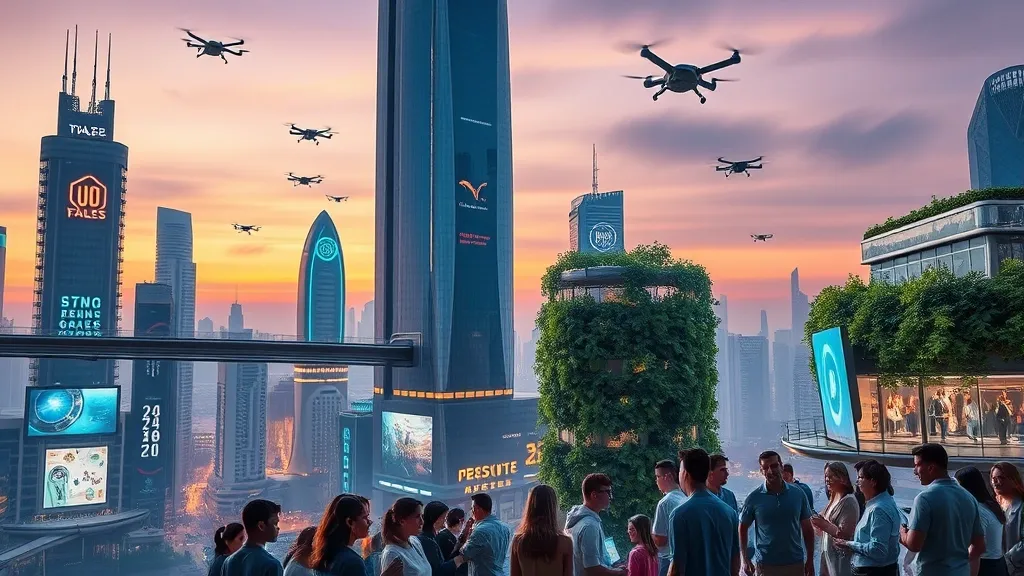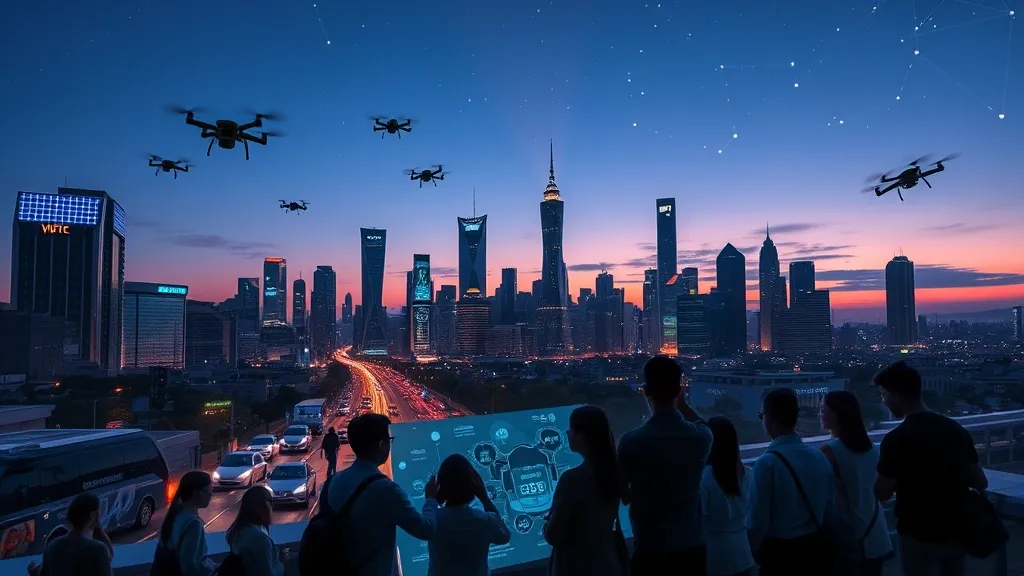The Quantum Leap: Computing Beyond Imagination
So, let’s dive into the whole quantum computing thing. I mean, it sounds like something straight outta a sci-fi movie, right? But here we are, on the brink of something that feels like magic. Quantum computing is like the superhero of the tech world, ready to take on problems that would take our classic computers eons to solve. Seriously, if you thought your laptop was fast, just wait until you meet a quantum computer!
At its core, quantum computing is all about qubits. Unlike regular bits, which are either a 0 or a 1 (super straightforward, right?), qubits can be both at the same time. It’s like they’re living in some sort of parallel universe where they can multitask like a champ. This nifty little trick allows quantum computers to process huge amounts of data way faster than traditional machines. Imagine solving complex equations in seconds that would take a classical computer years. Mind-blowing, isn’t it?
Now, I know what you’re thinking: “What does this mean for me?” Well, let me break it down. Think about everything from drug discovery to climate modeling. Quantum computing has the potential to revolutionize these fields. For example, in medicine, it could lead to breakthroughs in personalized medicine, helping doctors create treatments that are tailored specifically for you. That’s like having a superpower, right?
- Faster problem-solving: Say goodbye to those long waits for data analysis!
- Enhanced AI: Imagine AI that actually understands you. Crazy, huh?
- New materials: Quantum computing could help in developing materials that are tougher, lighter, and all-around awesome.
But hey, it’s not all rainbows and butterflies. We’re still in the early stages, and there’s a bunch of hurdles to jump over. Quantum computers are super delicate and require specific conditions to operate. Plus, there’s the whole issue of security. If quantum computers can crack codes in seconds, we might need to rethink how we protect our data. Yikes!
In a nutshell, the future of quantum computing is like a rollercoaster ride—exciting, a bit scary, and full of twists and turns. But if it lives up to the hype, it could change our lives in ways we can’t even imagine yet. Buckle up, folks; the ride’s about to get wild!
AI Companions: Friends or Foes?
So, let’s chat about AI companions. You know, those cute little bots or apps that claim to be your friend, but sometimes feel more like a weird experiment gone wrong? It’s a bit of a wild ride trying to figure out if they’re here to help us or just make things a whole lot stranger.
On one hand, these AI buddies can be super helpful. They can remind you of your mom’s birthday, help you find a recipe for dinner, or even just keep you company when you’re binge-watching that show you swore you wouldn’t start. I mean, who wouldn’t want a chatbot to listen to their deep thoughts about the latest episode of that sci-fi series? No judgment, right?
- AI companions can provide emotional support.
- They help with daily tasks and reminders.
- Some can even simulate conversation, which is kind of cool… or creepy?
But, on the flip side, there’s this nagging feeling that maybe we’re getting a little too cozy with our virtual pals. Like, do we really need a robot telling us You’re great! when we can just call our friends? Sure, it’s nice to have someone (or something) always available, but can it replace human interaction? Probably not. Plus, there’s that whole privacy issue. You know, the one where you’re sharing all your secrets with a program that could leak them to who-knows-where? Yikes.
Another thing that kinda bugs me is how these AI companions are marketed. It’s like they’re trying to sell you on the idea of friendship with a robot. I mean, I love technology, but I also love my friends who can give me real-life hugs and not just a virtual high-five. Sometimes it feels like we’re on the edge of a weird sci-fi movie where humans and robots are best buds. Like, do we really want our future to look like “Wall-E” but with less charm?
In the end, AI companions have their pros and cons. They can be helpful and fun, but we gotta remember they’re not a substitute for real human connection. It’s all about finding that balance between embracing the cool tech and keeping our actual relationships alive and kicking. So, what do you think? Are they friends, foes, or just… something in between?
The Green Revolution 2.0: Tech Meets Sustainability
Okay, let’s talk about something super cool happening right now: the Green Revolution 2.0. It’s like the first Green Revolution, but with a techy twist that even your grandma would be impressed by. Seriously, we’re talking drones, AI, and all that jazz, working together to make farming not just smarter but more sustainable. And honestly, it’s about time! Who knew that farming could be so high-tech?
So, what does this all mean? Well, for starters, it’s all about using technology to solve some of the biggest problems in agriculture today. Think about it: the world’s population is growing, and we’re gonna need a lot more food. But, we’ve got climate change messing with our crops and water shortages adding to the stress. It’s a total pickle, right? Enter tech!
- Drones: These little flying machines are doing more than just taking selfies. They’re monitoring crop health, assessing soil quality, and even helping with irrigation. Imagine a tiny robot pilot zooming around your farm, checking on everything while you sip your coffee. Sounds dreamy, huh?
- AI: Artificial Intelligence is stepping in to analyze data from all these fancy sensors. It helps farmers make better decisions, like when to plant or how much water to use. It’s like having a super-smart assistant who never sleeps (or asks for a raise).
- Vertical Farming: This is where things get really wild. Picture farming in skyscrapers! Vertical farms use less land and can produce food year-round. Plus, they’re often located right in the cities where the food is consumed. No more trucking in lettuce from a thousand miles away. Talk about fresh!
Sure, there are challenges, like the initial costs and the tech learning curve. But honestly, I think the benefits totally outweigh the hiccups. Plus, who doesn’t want to be part of a farming revolution that’s not just about getting more food but doing it in a way that’s kind to the planet?
In a nutshell, the Green Revolution 2.0 is bringing together the best of tech and sustainability. It’s like a match made in heaven, or at least in a really cool greenhouse. As we move forward, let’s hope we keep pushing the envelope and make our food systems not just smarter, but also kinder to our planet. Because if we don’t, who knows what we’ll be eating in the future? Yikes!
Life in the Metaverse: Are We Living in a Simulation?
Okay, let’s talk about the Metaverse for a sec. It feels like everyone’s buzzing about it these days, right? It’s like the new cool kid on the tech block, and honestly, it’s kind of wild to think about. Imagine a digital world where you can hang out with friends, go shopping, or even attend concerts—all without leaving your couch. Sounds like a dream, but then you start wondering, are we actually living in a simulation?
First things first, the Metaverse isn’t just some sci-fi fantasy anymore. Companies are pouring tons of cash into creating these immersive experiences. I mean, have you seen those VR headsets? They’re like the future wrapped in a plastic shell. It’s getting hard to tell what’s real and what’s not. Sometimes, I catch myself thinking, “Did I really just have that conversation in real life, or was I just in a virtual coffee shop?”
But here’s the kicker: if the Metaverse keeps evolving at this pace, are we gonna end up spending more time in these digital realms than in the actual world? I mean, I love a good Netflix binge, but I also enjoy the great outdoors. It’s like that age-old debate about whether you should watch a movie at home or go out to the theater. Except now, it’s like choosing between living your life or living in a game.
- Socializing: You can meet people from all over the world.
- Entertainment: Concerts, games, you name it.
- Work: Remote jobs could get a serious upgrade.
And here’s where it gets a bit philosophical. If we’re spending so much time in a simulation, does that mean we’re kind of living in one already? I mean, think about it. Our phones, social media, even video games—they all create a version of reality that can sometimes feel more real than, well, reality itself. It’s kind of like that scene in The Matrix, but with way more avatars and less leather.
So, are we living in a simulation? Maybe. But isn’t that part of the fun? The thrill of not knowing what’s real and what’s not? As long as we can still get outside and feel the sun on our faces, I think we’re doing okay. Just remember to occasionally unplug and enjoy the real world – it’s still got a lot to offer!



